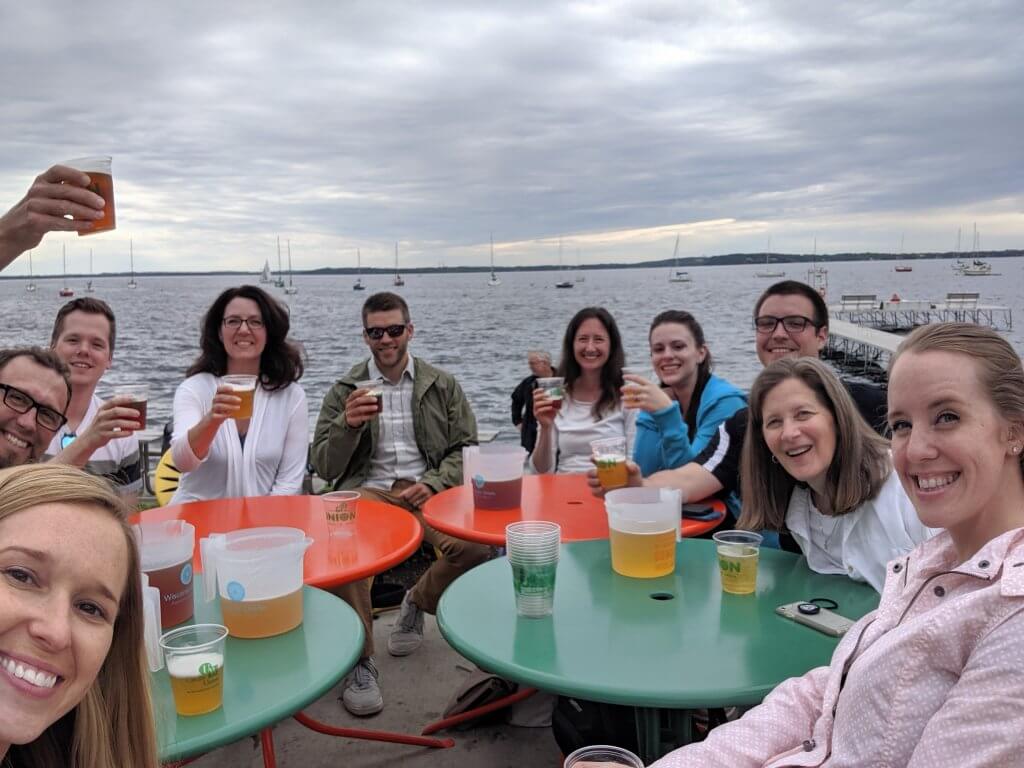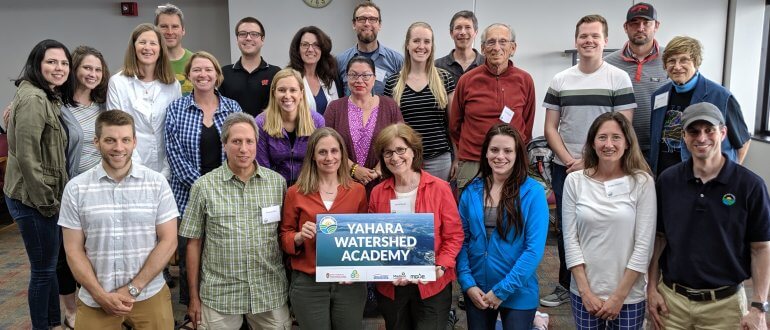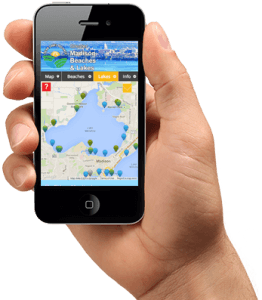Graduation day – the final class of 2019
About the author: My name is Karin Swanson and I am a student of the Yahara Watershed Academy. I work for Clean Lakes Alliance as the Marketing and Communications Associate Manager and I am a Meteorologist. I am sharing my journey through the Academy in an effort to expand our community’s knowledge and passion for the Yahara River Watershed.
Yahara Watershed Academy – June 2019 graduation day
It’s finally graduation day! It’s hard to believe it has been five months since our first Yahara Watershed Academy class. The Academy gathered once a month at various locations throughout the Yahara Watershed. The Academy involved a partnership with the University of Wisconsin-Madison Nelson Institute for Environmental Studies, Clean Lakes Alliance, and Edgewood College. Each class included presentations and guidance from professors and other leaders.
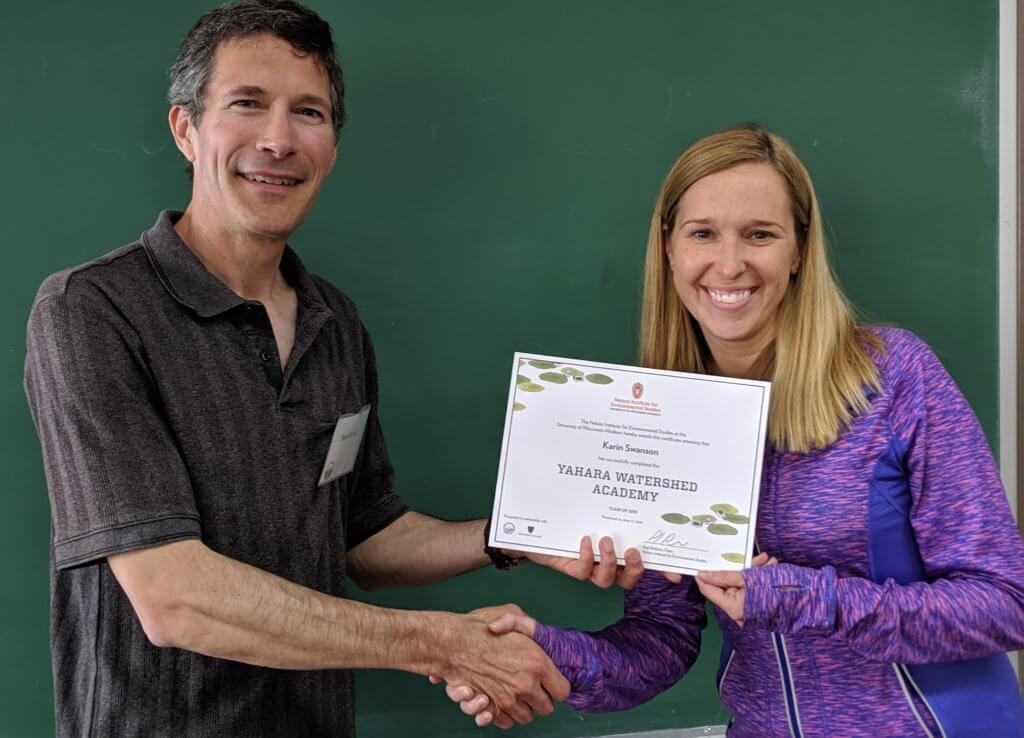
Graduation!
Spoiler alert! I graduated from the Yahara Watershed Academy on June 11th, along with nearly two dozen others in the cohort. The Nelson Institute for Environmental Studies at the University of Wisconsin-Madison presented certificates attesting to our completion of the Yahara Watershed Academy program. In addition, some of my classmates will receive continuing education units through Edgewood College.
World of Watershed Management Game
Graduation day of the Yahara Watershed Academy began with a role-playing activity called the “World of Watershed Management Game.” It was developed by Dr. Jake Walsh, a researcher with the UW Center for Limnology. The activity involved teams of stakeholders who advocated for their character’s position. I was assigned the role of a property owner. Other characters included scientists, farmers, outdoor enthusiasts, anglers, recreational boaters, lake association president, and county executive. Each person represented their character while constructing a local water management plan.
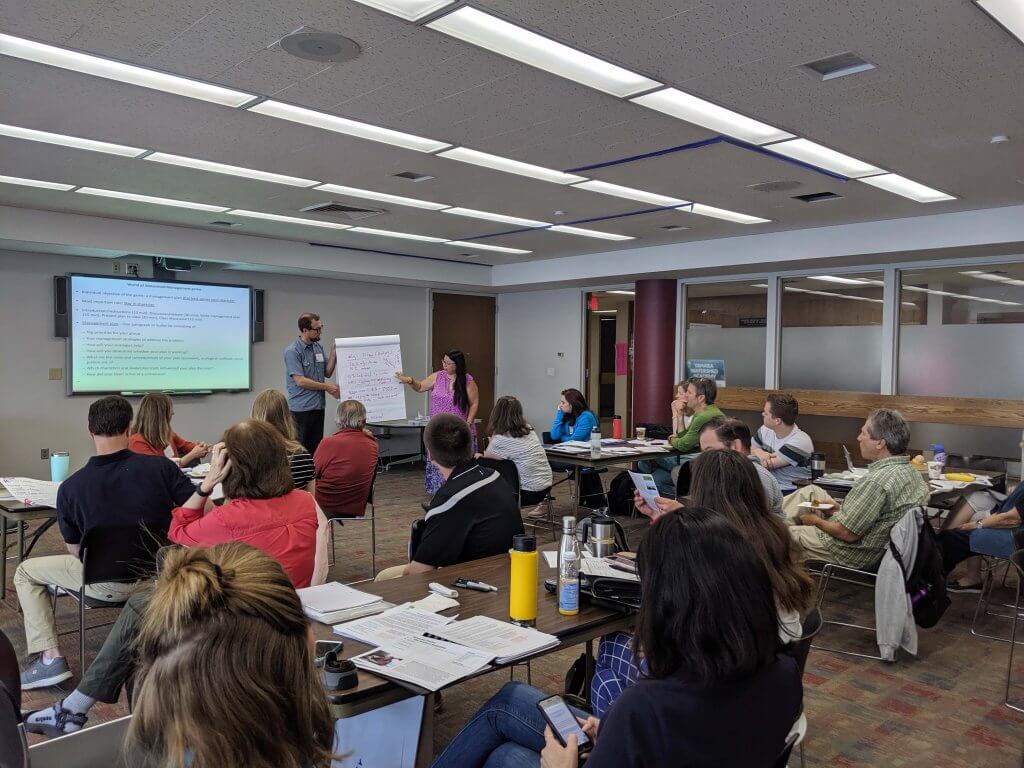
Forming a water management plan
On my team, we first discussed the priorities of our characters within the watershed. Next, we talked about potential barriers to building a management plan. From there, we were able to determine goals for our watershed, and a strategy to reach those goals. Throughout our discussion, we kept a record of any questions that needed to be resolved before our management plan could go into effect. Finally, our team was able to determine an action plan as well as financing that would support the plan.
Agreeing on a water management plan
There were four teams in total and each came up with a slightly different water management solution. Some of the teams had a bumpy journey to reach their solution, while others were able to agree quickly and make decisions without a great deal of debate. Presentations of our final plans sparked debate and discussion between the four Academy groups.
As a frame of reference, one woman in the class said she had spent years creating a watershed management plan for her job. The Yahara Watershed Academy was able to dedicate an hour of our time to the project. Everyone in the class seemed to gain an appreciation of the scope of work that goes into the creation of a real-world water management plan.
Course project presentations
One of the requirements of the Yahara Watershed Academy is to complete a course project. Each student has been developing a project that will positively impact Wisconsin’s watersheds. Below is a list of projects presented in class on graduation day:
Youth Education
Watershed education days – Partnership between Sun Prairie High School and American Family Insurance to coordinate educational activities and job shadowing.
Ripon Watershed tour and storm drain stenciling – Best management practices for urban and rural stormwater management taught to high school students. High schoolers also stenciled storm drains in Ripon to alert others to the connection between storm drains and what flows into the lake.
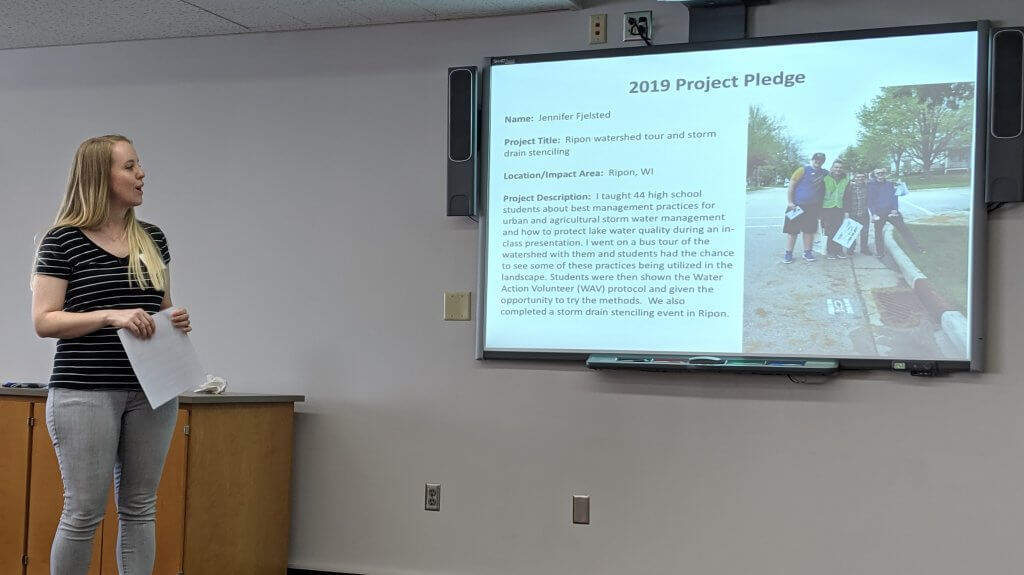
MSCR watershed education – The MSCR education project will connect the existing MSCR paddling program to a watershed curriculum.
Engaging youth through stormwater education – Using resources from UW-Extension and Ripple-Effects.com, this project will teach elementary students about stormwater.
Community Education
Native plantings for watershed health – Education within the Midvale Heights neighborhood about native plants, responsible lawn care, and the importance of keeping leaves out of the streets.
Glendale Neighborhood project – Educational project to increase awareness of the neighborhood’s storm drains and their impact on the Edna Taylor Conservancy and Lake Waubesa. The project will include storm drain marking and the distribution of educational materials.
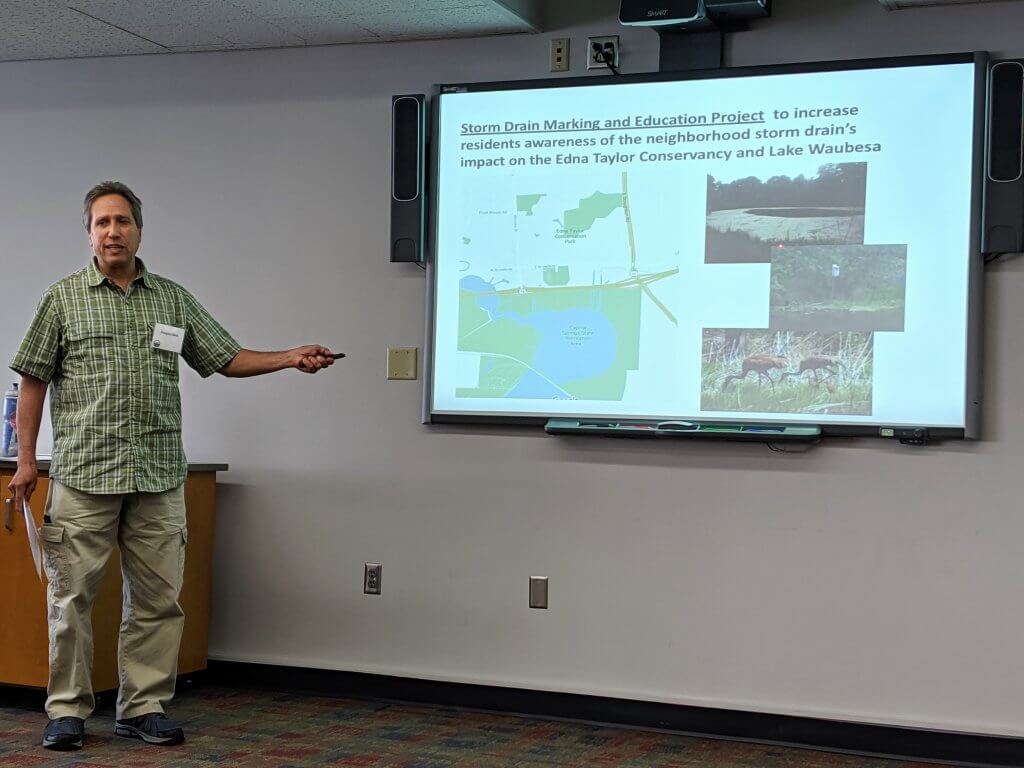
Yahara lakes shoreline aquatic plant management – Educate lake users and property owners about aquatic plant species and how they affect the lake ecosystem.
Print education
Urban and rural homeowner’s guide to reducing water pollution – Creation of educational guides for distribution to homeowners. One is a guide for rural riparian homeowners along the Lower Wisconsin State Riverway, and the other is a guide for urban homeowners in the Lake Wingra Watershed.
Digital outreach for our Yahara Watershed – Articles and posts created for the Clean Lakes Alliance website and social media accounts to help educate a wider audience about topics related to our watershed.
Taking action at places of work
Further engagement of volunteers at Johnson Financial Group – Johnson Financial Group is already an active business volunteer with Clean Lakes Alliance and with other community nonprofits. Employees are currently given one paid day a year to volunteer, but this project will increase volunteer time and engagement.
National Guardian Life Insurance Company rain gardens – An action plan is being developed to install a rain garden at the business. NGL is located next to Lake Mendota, so a rain garden will help decrease runoff and therefore improve water quality.
Recycling continuous improvement team – This project will develop a team of employees to continue to improve recycling and sustainability practices at MG&E.
Taking action in our community
Neighborhood rain garden tour – Promotion of rain gardens through a rain garden bike tour, with additional advice for those looking to create a rain garden.
Neighborhood writing group – Formation of a science and nature writing group through a local writing business to explore water topics.
Stormwater stewardship – Utilizing neighborhood associations to help maintain stormwater drains.
A faithful journey through our watershed – Development of a prayer resource for the challenges of our watershed. The prayer resource will be interchangeable between religions and beliefs.
Speaking engagements
Podcast on environmental anxiety and the role of watersheds – Development of a podcast to explore environmental and climate anxiety. The podcast will examine the connections between emotional stress and environmental stress.
Community collaboration and leadership on Lac du Orielle Reservation – Presentations and workshops will be completed at the 2nd annual “Women and Men Gathering Together for the Water” event in northern Wisconsin.
Increasing butterfly populations with native plantings – Poster presentation at a conference about the importance of milkweed and native plantings and the connection to our landscape.
Graduation day pontoon outing
The Yahara Watershed Academy has made it a point to explore and learn about various parts of the Yahara Watershed. The June class culminated in a Lake Mendota educational tour. From the UW Goodspeed Family Pier, the Academy boarded three large pontoon boats. MSCR, Marshall Boats, and Clean Lakes Alliance volunteer water quality monitors donated the boats.

My boat headed to the UW Center for Limnology first. The tour guide for the boat was Emily Whitaker, a master’s student in the Freshwater and Marine Sciences Department at the University of Wisconsin-Madison.
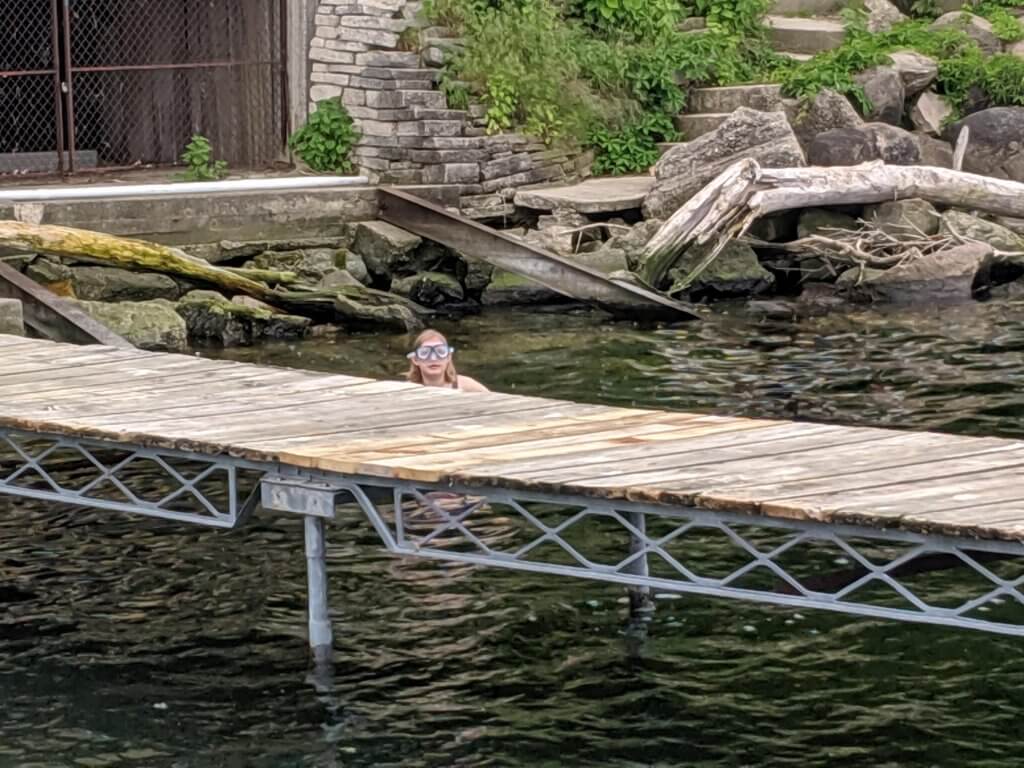
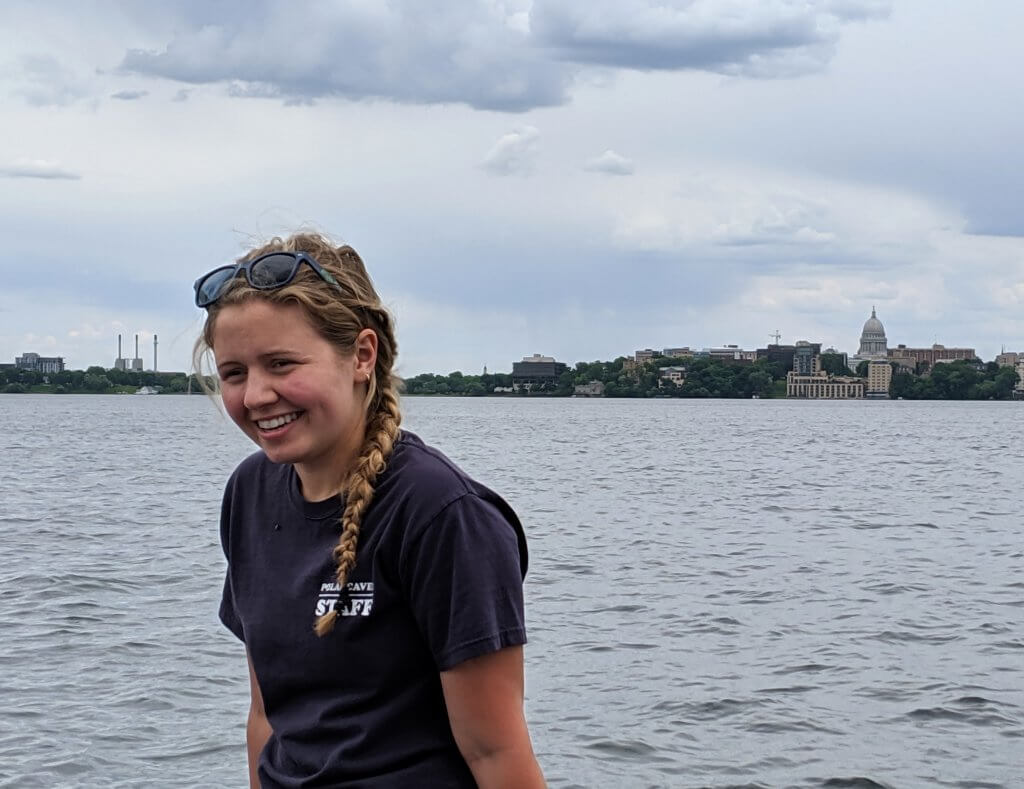
Zebra mussels in Lake Mendota
At the UW Center for Limnology, an undergraduate student free dove for zebra mussels. She went underwater briefly and surfaced holding a rock covered in zebra mussels. Zebra mussels were first discovered in Lake Mendota in 2015, and can be found in very high concentrations in certain parts of the lake. The student told us the zebra mussels are so abundant in this part of the lake, she could have grabbed just about any rock and it would have been covered in the invasive species.
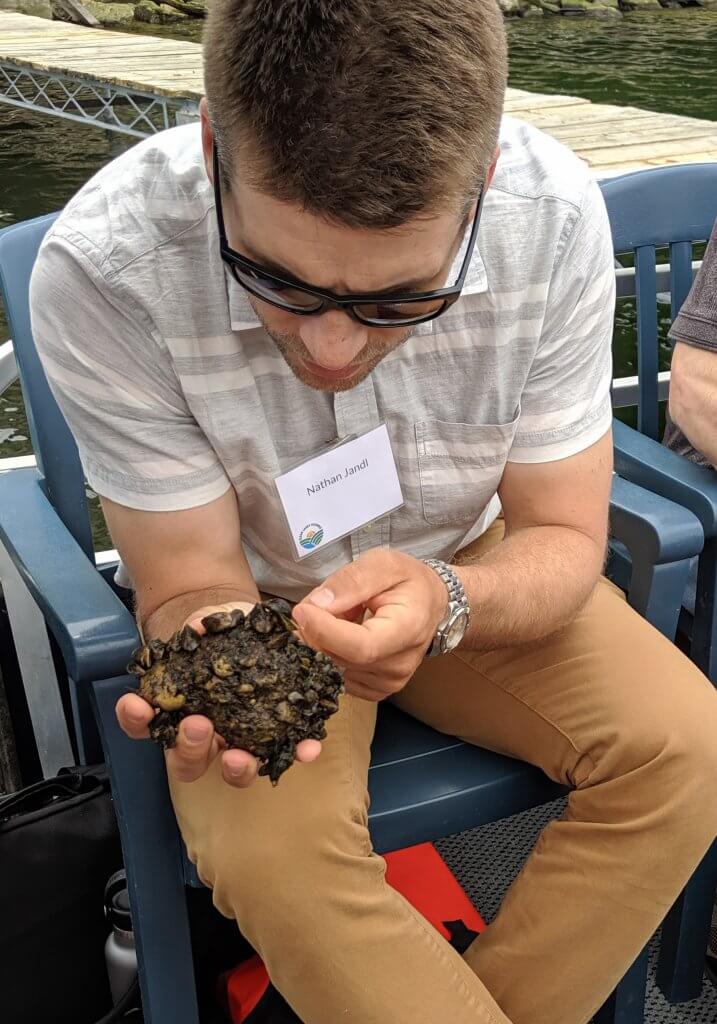
Zebra mussels are shifting the ecosystem of Lake Mendota. The invasive species tends to create clearer water in the center of the lake, but murkier water along the shorelines.
Eddy Flux Tower
The second stop on the boat outing took us to the UW Center for Limnology’s Eddy Flux Tower. At the end of Picnic Point sits a tall pole with numerous instruments at the top. The tower measures wind, precipitation, and gas flux from carbon dioxide, methane, and hydrogen. It also keeps watch over Lake Mendota’s ice, helping to document ice-on and ice-off. Real time data from the Eddy Flux Tower is used in research at the University of Wisconsin.
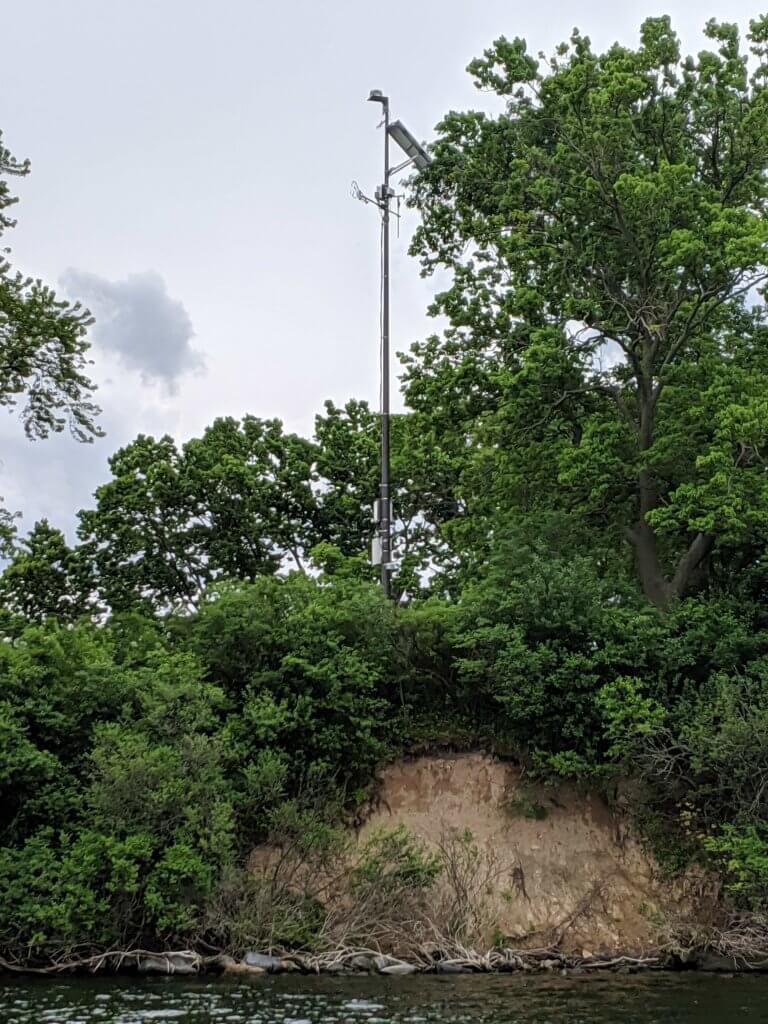
While stopped at the Eddy Flux Tower, we learned about what some limnologists refer to as, “the methane burp.” This occurs in the springtime when the ice melts. During the winter, methane gas becomes trapped beneath the ice as plants decompose and bacteria produce methane. When the ice melts, there is a one to two day time span when a higher concentration of methane is released.
“David Buoy”
The third stop on the boat tour took us to the UW Center for Limnology buoy. We were told the buoy is humorously referred to as, “David Buoy,” by the Center for Limnology. Air and water temperature, wind speed and direction, and water clarity are recorded at the buoy. The buoy is part of the National Science Foundation’s Long-Term Ecological Research Network. The buoy has sampled Lake Mendota’s waters for the last 15 years, but is removed every winter. Real-time buoy data can be found here: https://limnology.wisc.edu/buoy/
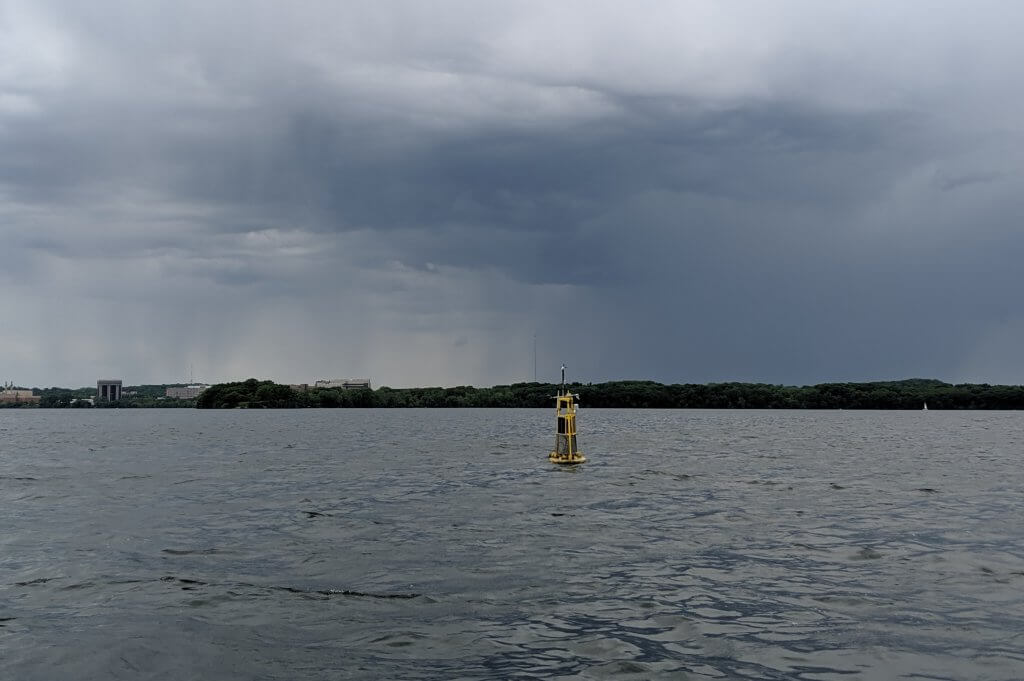
As we were looking out over the buoy, someone on the boat spotted a far-off flash of lightning. We decided to keep ourselves safe and return to the pier. One woman on the boat said it was “wakinyan.” She said that was the Lakota/Dakota term meaning, “The thunderspirits are coming in.”
Leadership Activity
The final activity of our graduation day included a leadership exercise in which we divided up to discuss leadership traits. The Yahara Watershed Academy divided up based on the leadership trait we felt most connected to. The four traits included: action, data, relationship, and big picture leadership styles. Learning about the four traits helped the class discuss strengths and weaknesses of each style as a way to become better leaders.
Course wrap up
The Yahara Watershed Academy wrapped up with a discussion about all we had learned over the last five months. We reviewed the speakers and the highlights of each class. We also discussed the six main themes of the class:
- Limnology and watershed science
- Health and economic connections
- Land ethic
- Climate impacts
- Community inclusion
- Leadership
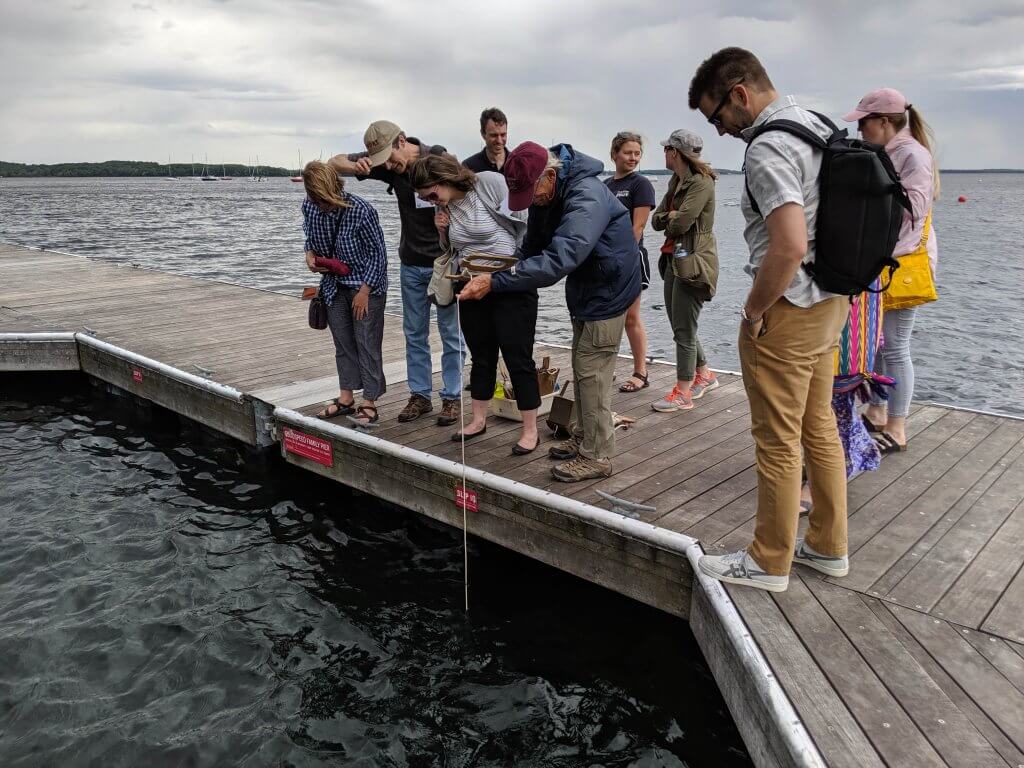
June 11th may have been the last day of class, but for all in the Academy, we know it’s not the end. It’s the commencement, and we have learned to take action for the entire watershed.
Graduation!
Almost two dozen students graduated from the Yahara Watershed Academy in June. We were presented with a certificate from the University of Wisconsin Nelson Institute for Environmental Studies. The certificate names us as graduates of the Yahara Watershed Academy.
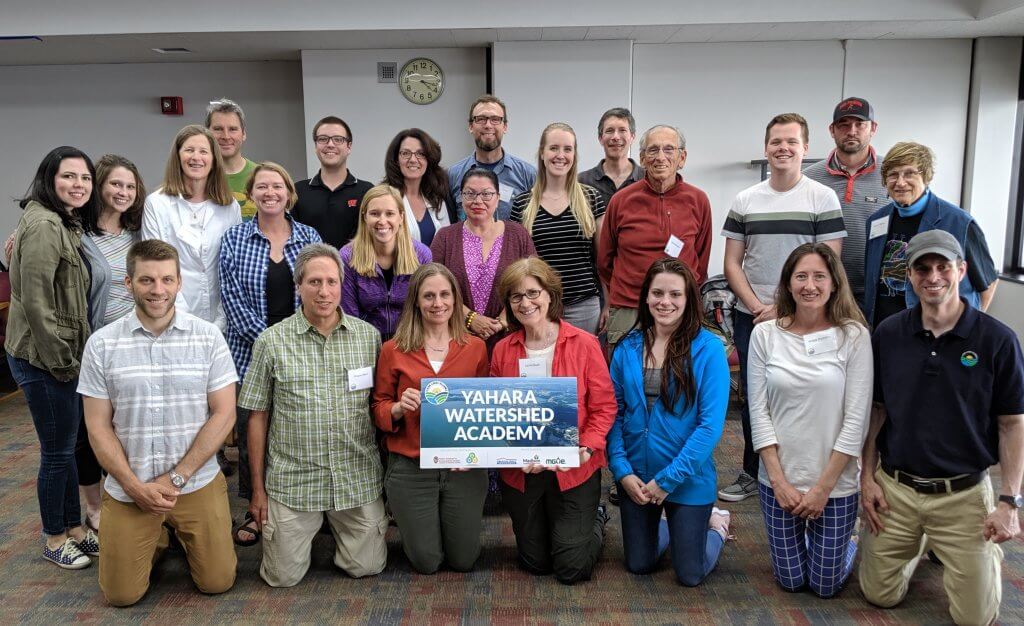
Celebration on the UW Memorial Union Terrace
